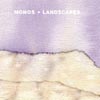MONOS, "LANDSCAPES"
ICR
 I have to wonder what the trio of Darren Tate, Colin Potter, and PaulBradley has in mind when they record a set such as this one. Perhapsthey have in mind the construction of psychic hammer dedicated to theeradication of the sensual world or perhaps they simply mean to open upa space where it seems that no such space could possibly fit or exist. Landscapes has the strange quality of being both musical and completely self-indulgent."Entering" is a thirty minute circle of guitar, heavy moaning, andmonumental volume and "Surface Form" is a chugging and throbbing chunkof absolute isolation. If I'd never heard anything by any of thesemusicians, I'd find it very difficult to sit through this entire albumfrom beginning to end. Aside from the guitar on "Entering" there isabsolutely no reference point that might serve as a familiar anchor;the density of every second of sound on Landscapes is imposingand undeniably rewarding, but I'd start somewhere else if I wereinterested in anything by Tate, Potter, or Bradley. Once I got overjust how thick and sludgy the album is, the tiny nuances and nearsubliminal sounds that are littered everywhere on this record revealthemselves and demand that the record be listened to again and again.Whispering collisions and intricate networks of sonic tunnels rumbleunderneath the imposing rumble of organs bellowing sheer intensity. Attimes the tone is so low that the music is manifested on physically asa material vibration: at this point active listening becomes important.While many records of this type might serenade me into believing itsokay to relax my senses and listen passively, Monos demand a carefuland direct attention. There is literally an entirely different albummoving beneath the pure, direct, and constant hum of machine-generatedgroans and waves. Darren Tate's artwork is the perfect visual exampleof what the music sounds like: the bumpy and burned fibers of the coverart suggest a layering of tones, thoughts, and feelings. I wasreluctant to listen to Landscapes at times because, on thesurface, it feels like such a desolate and uniform recording; repeatlistens have revealed it to be so. This is a desert of sound on thesurface, but the record grants the chance to see below the surface andinto the heart of appearances themselves.
I have to wonder what the trio of Darren Tate, Colin Potter, and PaulBradley has in mind when they record a set such as this one. Perhapsthey have in mind the construction of psychic hammer dedicated to theeradication of the sensual world or perhaps they simply mean to open upa space where it seems that no such space could possibly fit or exist. Landscapes has the strange quality of being both musical and completely self-indulgent."Entering" is a thirty minute circle of guitar, heavy moaning, andmonumental volume and "Surface Form" is a chugging and throbbing chunkof absolute isolation. If I'd never heard anything by any of thesemusicians, I'd find it very difficult to sit through this entire albumfrom beginning to end. Aside from the guitar on "Entering" there isabsolutely no reference point that might serve as a familiar anchor;the density of every second of sound on Landscapes is imposingand undeniably rewarding, but I'd start somewhere else if I wereinterested in anything by Tate, Potter, or Bradley. Once I got overjust how thick and sludgy the album is, the tiny nuances and nearsubliminal sounds that are littered everywhere on this record revealthemselves and demand that the record be listened to again and again.Whispering collisions and intricate networks of sonic tunnels rumbleunderneath the imposing rumble of organs bellowing sheer intensity. Attimes the tone is so low that the music is manifested on physically asa material vibration: at this point active listening becomes important.While many records of this type might serenade me into believing itsokay to relax my senses and listen passively, Monos demand a carefuland direct attention. There is literally an entirely different albummoving beneath the pure, direct, and constant hum of machine-generatedgroans and waves. Darren Tate's artwork is the perfect visual exampleof what the music sounds like: the bumpy and burned fibers of the coverart suggest a layering of tones, thoughts, and feelings. I wasreluctant to listen to Landscapes at times because, on thesurface, it feels like such a desolate and uniform recording; repeatlistens have revealed it to be so. This is a desert of sound on thesurface, but the record grants the chance to see below the surface andinto the heart of appearances themselves.
 I have to wonder what the trio of Darren Tate, Colin Potter, and PaulBradley has in mind when they record a set such as this one. Perhapsthey have in mind the construction of psychic hammer dedicated to theeradication of the sensual world or perhaps they simply mean to open upa space where it seems that no such space could possibly fit or exist. Landscapes has the strange quality of being both musical and completely self-indulgent."Entering" is a thirty minute circle of guitar, heavy moaning, andmonumental volume and "Surface Form" is a chugging and throbbing chunkof absolute isolation. If I'd never heard anything by any of thesemusicians, I'd find it very difficult to sit through this entire albumfrom beginning to end. Aside from the guitar on "Entering" there isabsolutely no reference point that might serve as a familiar anchor;the density of every second of sound on Landscapes is imposingand undeniably rewarding, but I'd start somewhere else if I wereinterested in anything by Tate, Potter, or Bradley. Once I got overjust how thick and sludgy the album is, the tiny nuances and nearsubliminal sounds that are littered everywhere on this record revealthemselves and demand that the record be listened to again and again.Whispering collisions and intricate networks of sonic tunnels rumbleunderneath the imposing rumble of organs bellowing sheer intensity. Attimes the tone is so low that the music is manifested on physically asa material vibration: at this point active listening becomes important.While many records of this type might serenade me into believing itsokay to relax my senses and listen passively, Monos demand a carefuland direct attention. There is literally an entirely different albummoving beneath the pure, direct, and constant hum of machine-generatedgroans and waves. Darren Tate's artwork is the perfect visual exampleof what the music sounds like: the bumpy and burned fibers of the coverart suggest a layering of tones, thoughts, and feelings. I wasreluctant to listen to Landscapes at times because, on thesurface, it feels like such a desolate and uniform recording; repeatlistens have revealed it to be so. This is a desert of sound on thesurface, but the record grants the chance to see below the surface andinto the heart of appearances themselves.
I have to wonder what the trio of Darren Tate, Colin Potter, and PaulBradley has in mind when they record a set such as this one. Perhapsthey have in mind the construction of psychic hammer dedicated to theeradication of the sensual world or perhaps they simply mean to open upa space where it seems that no such space could possibly fit or exist. Landscapes has the strange quality of being both musical and completely self-indulgent."Entering" is a thirty minute circle of guitar, heavy moaning, andmonumental volume and "Surface Form" is a chugging and throbbing chunkof absolute isolation. If I'd never heard anything by any of thesemusicians, I'd find it very difficult to sit through this entire albumfrom beginning to end. Aside from the guitar on "Entering" there isabsolutely no reference point that might serve as a familiar anchor;the density of every second of sound on Landscapes is imposingand undeniably rewarding, but I'd start somewhere else if I wereinterested in anything by Tate, Potter, or Bradley. Once I got overjust how thick and sludgy the album is, the tiny nuances and nearsubliminal sounds that are littered everywhere on this record revealthemselves and demand that the record be listened to again and again.Whispering collisions and intricate networks of sonic tunnels rumbleunderneath the imposing rumble of organs bellowing sheer intensity. Attimes the tone is so low that the music is manifested on physically asa material vibration: at this point active listening becomes important.While many records of this type might serenade me into believing itsokay to relax my senses and listen passively, Monos demand a carefuland direct attention. There is literally an entirely different albummoving beneath the pure, direct, and constant hum of machine-generatedgroans and waves. Darren Tate's artwork is the perfect visual exampleof what the music sounds like: the bumpy and burned fibers of the coverart suggest a layering of tones, thoughts, and feelings. I wasreluctant to listen to Landscapes at times because, on thesurface, it feels like such a desolate and uniform recording; repeatlistens have revealed it to be so. This is a desert of sound on thesurface, but the record grants the chance to see below the surface andinto the heart of appearances themselves. samples:



